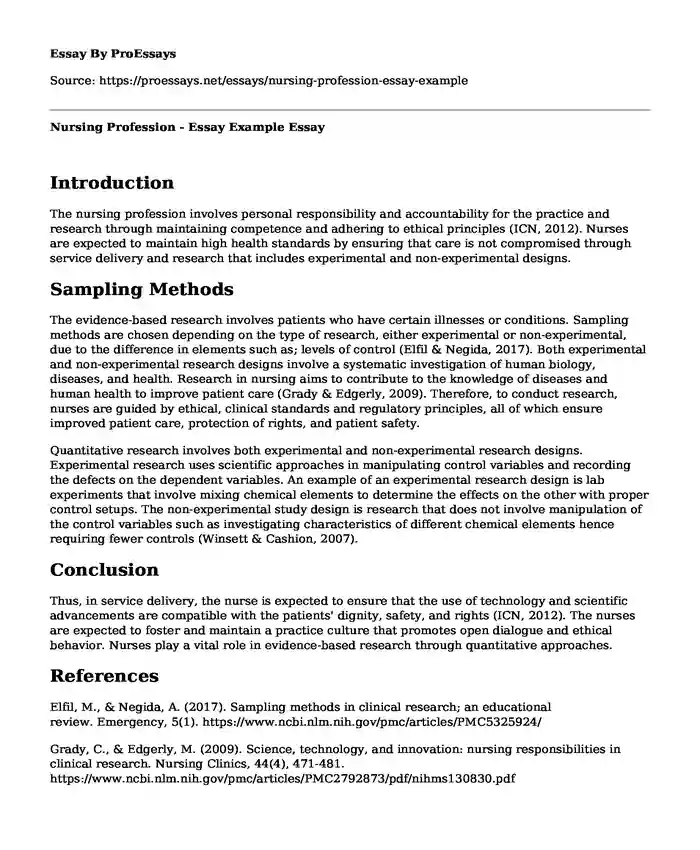Introduction
The nursing profession involves personal responsibility and accountability for the practice and research through maintaining competence and adhering to ethical principles (ICN, 2012). Nurses are expected to maintain high health standards by ensuring that care is not compromised through service delivery and research that includes experimental and non-experimental designs.
Sampling Methods
The evidence-based research involves patients who have certain illnesses or conditions. Sampling methods are chosen depending on the type of research, either experimental or non-experimental, due to the difference in elements such as; levels of control (Elfil & Negida, 2017). Both experimental and non-experimental research designs involve a systematic investigation of human biology, diseases, and health. Research in nursing aims to contribute to the knowledge of diseases and human health to improve patient care (Grady & Edgerly, 2009). Therefore, to conduct research, nurses are guided by ethical, clinical standards and regulatory principles, all of which ensure improved patient care, protection of rights, and patient safety.
Quantitative research involves both experimental and non-experimental research designs. Experimental research uses scientific approaches in manipulating control variables and recording the defects on the dependent variables. An example of an experimental research design is lab experiments that involve mixing chemical elements to determine the effects on the other with proper control setups. The non-experimental study design is research that does not involve manipulation of the control variables such as investigating characteristics of different chemical elements hence requiring fewer controls (Winsett & Cashion, 2007).
Conclusion
Thus, in service delivery, the nurse is expected to ensure that the use of technology and scientific advancements are compatible with the patients' dignity, safety, and rights (ICN, 2012). The nurses are expected to foster and maintain a practice culture that promotes open dialogue and ethical behavior. Nurses play a vital role in evidence-based research through quantitative approaches.
References
Elfil, M., & Negida, A. (2017). Sampling methods in clinical research; an educational review. Emergency, 5(1). https://www.ncbi.nlm.nih.gov/pmc/articles/PMC5325924/
Grady, C., & Edgerly, M. (2009). Science, technology, and innovation: nursing responsibilities in clinical research. Nursing Clinics, 44(4), 471-481. https://www.ncbi.nlm.nih.gov/pmc/articles/PMC2792873/pdf/nihms130830.pdf
ICN, (2012). The ICN Code of Ethics for Nurses," by the International Council of Nurses. International Council of Nurses. https://www.icn.ch/sites/default/files/inline-files/2012_ICN_Codeofethicsfornurses_%20eng.pdf
Winsett, R. P., & Cashion, A. K. (2007). The Nursing Research Process. Nephrology Nursing Journal, 34(6). https://www.researchgate.net/profile/Rebecca_Winsett/publication/5647190_The_nursing_research_process/links/0deec52b32864904b7000000/The-nursing-research-process.pdf.
Cite this page
Nursing Profession - Essay Example. (2023, Nov 16). Retrieved from https://proessays.net/essays/nursing-profession-essay-example
If you are the original author of this essay and no longer wish to have it published on the ProEssays website, please click below to request its removal:
- Bar Code Medication Administration Essay Example
- Interview a Nurse Practitioner Paper Example
- Research Paper on Non-Disease: Exploring Newman's HEC Model in Nursing Practice
- Paper Example on HIV/AIDS Epidemic: Impact on American Indians
- Paper Sample on Maximizing Shareholders Wealth: The Benefits of a Good Capital Structure and Financing Strategy
- Nurse Self-Growth: Achieving the Best Self for Quality Care - Essay Sample
- Synergy of Human Rights and Ethical Principles in Nursing: A Comprehensive Overview Example







